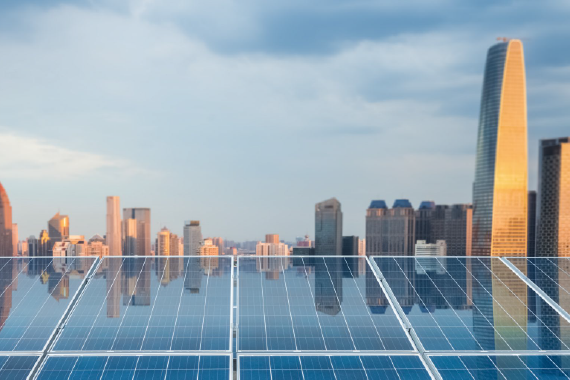We collaborate to achieve sustainable success
A leading environmental solution provider
Get in touch with usEnergy Efficiency as a Strategic Asset - Cutting Costs and Emissions in Buildings and Industry
In the urgent global push towards net zero emissions, energy efficiency remains an often underappreciated driver of change. While ambitious targets for renewable energy deployment frequently capture headlines, the fundamental task of reducing energy consumption across buildings and industries is equally, if not more, critical to meeting climate goals and realising substantial economic benefits. The year 2025 represents a pivotal moment for accelerating energy efficiency initiatives, propelled by rising energy costs, growing environmental awareness, and evolving regulatory frameworks.
The Unmet Potential: Europe’s Energy Efficiency Gap
Energy efficiency is central to the European Union’s climate strategy, anchored in the EU Energy Efficiency Directive, which sets binding targets for Member States. The Directive requires a reduction in energy use of 11.7% by 2030, yet current plans are falling short. Projections suggest that by 2030, energy consumption will overshoot the target by 31.1 million tonnes of oil equivalent (Mtoe), underscoring the urgent need for stronger measures.
To close this gap, Member States are encouraged to triple building renovation rates and accelerate reforms in the transport sector. Several countries, including France, Spain, Italy, and Poland, already operate compliance markets for energy efficiency, providing mechanisms to stimulate investment and ensure accountability. Similar schemes are emerging elsewhere in Europe, reflecting a growing recognition that efficiency is not only a compliance obligation but also a strategic opportunity.
For businesses and industries, this presents an opportunity to move beyond minimum requirements. By investing in energy efficiency and integrating renewable solutions, companies can gain a competitive advantage while contributing to global emission reductions, potentially cutting emissions by up to 55% by 2025.
Cutting-Edge Trends in Energy Efficiency
The energy efficiency landscape is rapidly evolving, offering innovative solutions for both commercial and industrial applications:
- Smart Building Technology: Smart building solutions are at the forefront of energy optimisation. AI-powered thermostats, intelligent lighting systems, and connected appliances adapt to user behaviour and environmental conditions, automatically adjusting energy use to reduce waste and lower costs.
- Next-Generation Insulation: Advanced materials such as bio-based spray foams and aerogels are transforming insulation, delivering superior thermal performance and reducing heating and cooling requirements by up to 40%.
- Integrated Renewables: Solar roofing and energy-generating windows are increasingly incorporated into architectural design, enabling buildings to produce their own electricity seamlessly.
- High-Performance Heat Pumps: Advances in heat pump technology, including geothermal integration, are redefining sustainable climate control. These systems deliver comfort with minimal energy consumption, significantly reducing carbon footprints.
- Industrial Energy Management: Comprehensive energy audits provide the foundation for reducing energy use and costs. Upgrading to energy-efficient machinery, adopting renewable power, and deploying advanced energy management systems that track consumption in real time are proving essential for reducing emissions and ensuring compliance.
- Regulatory Drivers: New EU rules reinforce the importance of energy efficiency. Companies consuming more than 23.6 GWh annually must implement an energy management system by October 2027, while those consuming above 2.75 GWh must carry out energy audits. Action plans must also be published in annual reports, ensuring transparency and accountability.
Strategic Benefits for Your Business
Investing in energy efficiency offers compelling returns, extending far beyond regulatory compliance:
- Significant Cost Savings: Directly reduces operational expenditure by lowering energy bills.
- Reduced Carbon Footprint: Contributes to emission reduction targets and strengthens sustainability credentials.
- Enhanced Competitiveness: Positions your business as a sustainability leader, appealing to environmentally conscious consumers and investors.
- Regulatory Compliance: Ensures adherence to increasingly stringent efficiency mandates and avoids potential penalties.
- Improved Resilience: Reduces reliance on volatile energy markets and strengthens energy security.
How AFS Energy Can Be Your Partner
AFS Energy is committed to guiding organisations towards robust climate solutions, helping them to meet both sustainability and regulatory goals. Our expertise in navigating complex energy markets and delivering tailored strategies makes us the ideal partner on your energy efficiency journey:
- Strategic Advisory: We support you in developing a tailored roadmap that aligns your energy efficiency initiatives with wider business objectives and sustainability strategies.
- Identifying Opportunities: Our team can pinpoint areas for energy savings through in-depth analysis, identifying the most impactful technologies and approaches.
- Market Insights: We provide intelligence on market conditions and emerging technologies, ensuring investments are both cost-effective and environmentally aligned.
- Compliance Support: We help ensure that efficiency initiatives support regulatory obligations and enhance your organisation’s market positioning by demonstrating sustainability leadership.
In 2025, energy efficiency is a strategic imperative. By embracing innovative technologies and expert guidance, your organisation can unlock significant cost savings, substantially reduce environmental impact, and build a more resilient, sustainable future.


